
Beyond Skin-Deep – June 2016, Canadian Packaging
By George Guidoni, Editor; Photos by Naomi Hiltz
Automation Design & Innovation Food Safety Bottling Cartoning Coding & Labeling Conveying Palletizing AmbaFlex Canada L.P. CHEP Canada Inc. Coca-Cola Coca-Cola Refreshments Canada Descon Conveyor Systems H.B. Fuller Company Muller LCS Nordson Canada Omron Canada Inc. Quantifeel Republic Manufacturing/R. E. Morrison SEW-Eurodrive Co. of Canada Ltd. slideshow Smart Skin Technologies T-Tek Material Handling Videojet Technologies WestRockA high-speed Coca-Cola canning line deploys innovative sensor technology to predict and prevent potential product quality issues in real time
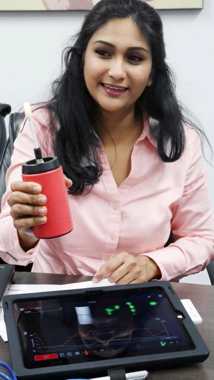
Quality assurance manager Kavitha Naidu holds up the Quantifeel drone can embedded with tiny sensors within its rubbery red skin surface to pick up and record all the points of impact while traveling along the line.
Just as an ounce of prevention is always better than a pound of cure, resolving product quality issues before they occur is a priceless commodity for today’s busy high-speed packaging lines.
And you’d be hard pressed to find things busier or faster than the four high-speed canning lines housed at a sprawling, 225,000-square-foot production facility operated by Coca-Cola Refreshments Canada in Toronto’s northwest neighborhood of Weston.
A key part of Coca-Cola’s Canadian manufacturing footprint for over 60 years, the 130-employee Weston canning plant runs largely flat-out on a three-shift, six-days-a-week schedule to produce millions of cases of canned Coca-Cola, Diet Coke and Coke Zero brands of the company’s beloved cola beverages for coast-to-coast distribution across Canada.
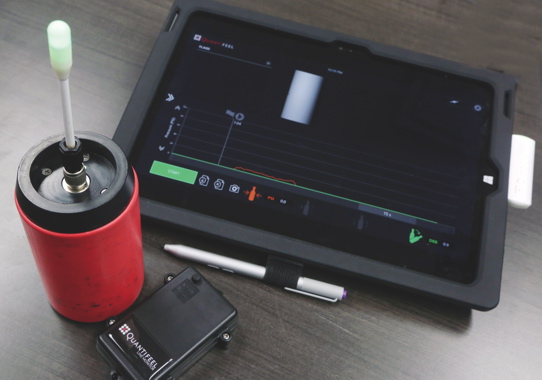
The information picked up by the drone can’s sensors is read by a series of black-colored Quantifeel tags positioned along the canning line and displayed as a pressure heat map on the system’s touchscreen terminal.
Along with packaging the Nestea brand of iced teas and co-packing the fast-growing Monster brand of energy drinks, the Weston plant is a highly automated operation whose somewhat weathered exterior belies the wealth of modern, cutting-edge technologies employed inside to produce over 50 different fast-moving SKUs (stockkeeping units) at lightning throughput speeds and under extremely tight tolerance levels for final product quality.
Producing a fairly diverse range of packaging sizes and formats—from banded six-packs to 32-can boxes, in sizes from 222-ml ‘mini-cans’ to the wide-mouth 695-ml ‘King cans’—the Weston plant takes pride in putting a high premium on product quality, according to the plant’s quality assurance manager Kavitha Naidu and plant manager Omar Silva-Zapata.
“The Weston facility has adapted to the many changes in the industry,” says Silva-Zapata, citing four major plant upgrades, expansions and modernization projects carried out at the venerable facility over the years. “Our experienced workforce is diligent and passionate about producing the Coca-Cola brands, working extremely hard to guard our reputation.
“Our production lines are continuously upgraded to ensure state-of-the-art performance,” Silva-Zapata told Canadian Packaging on a recent visit to the Weston plant.
“The result is a lean operation that is competitive, flexible and capable of ensuring the highest standards of quality and food safety for our customers and consumers,” he states.
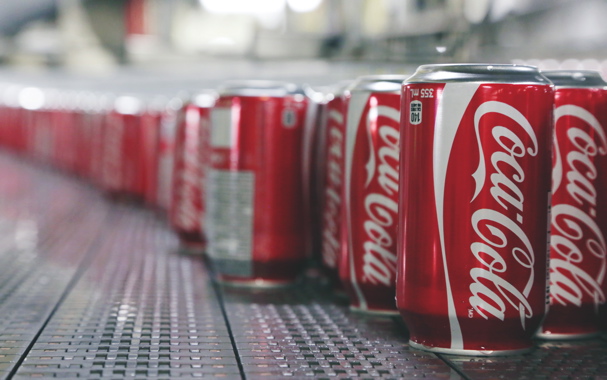
Manufactured by the Ball Packaging production facility in Whitby, Ont., the lightweight 355-ml aluminum cans of Coca-Cola are automatically rinsed and conveyed towards filling stages just above a high-volume blower positioned
underneath to remove all excess moisture from the cans.
With the global beverage industry being “one of the most competitive in the world,” according to Silva-Zapata, the Weston plant spares no effort or expense to maintain its good standing in the Coca-Cola’s far-flung global empire—boasting globally-recognized ISO (International Standards Organization) for quality managements in three most critical categories (ISO 9001, 14001 and 18001), along with the vaunted FSSC 22000 food safety standard accreditation issued by global standards organization NSF International.
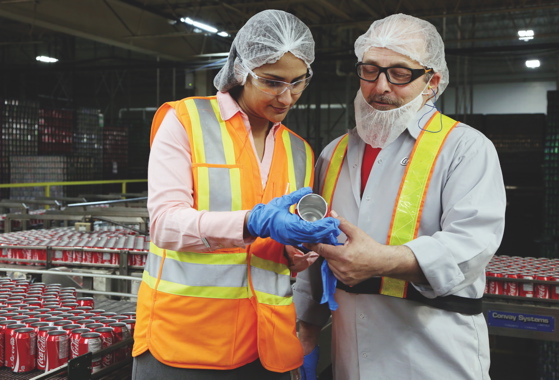
Kavitha Naidu and plant lead-hand Frank Stirpe conduct a random quality check on an empty can pulled off the fast-moving Line One to inspect for any signs of denting or other points of impact that can result in a product defect.
In addition, the Weston plant is also fully IMS (Integrated Management Systems)-certified for food and workplace safety, quality and environmental management, with its production staff well-trained in all aspects of HACCP (Hazardous Analysis Critical Control Points), GMP (Good Manufacturing Practice) and CIP (Clean-in-Place) protocols and procedures tailored to demands of the Weston plant’s unique hot-fill pasteurization process.
With quality being Coca-Cola’s number one commitment, the company is always looking for the latest technology to improve production while increasing throughput speeds, which currently reach up to 1,600 cans per minute.
Most recently, the Weston facility deployed an innovative sensor-based inline quality assurance system developed by technology entrepreneurs Smart Skin Technologies of Fredericton, N.B.
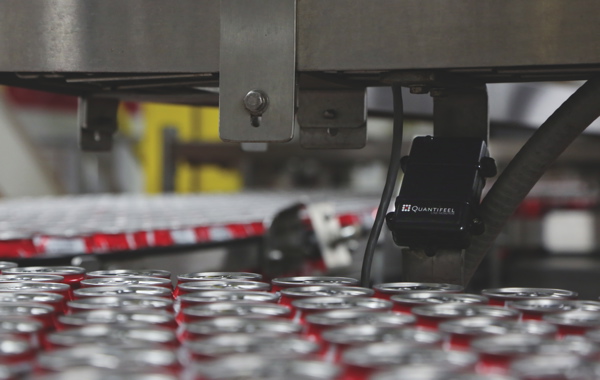
One of many Quantifeel tags installed above the fast-moving rows of filled cans of Coca-Cola cans picks up real-time line status updates from the red drone can also traveling along the conveyor belt to locate excessive pressure points.
Called Quantifeel, the system is based on the use of a sensor-activated container shaped to the exact dimension of containers used on the packaging line and wrapped with a rubbery-layer of a layer of Smart Skin material embedded with millions of tiny sensors to record all the movement and external forces experienced while traveling along the line with the real packaging containers, including cans, glass bottles and PET (polyethylene terephthalate) plastic containers.
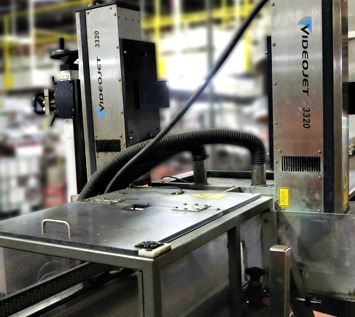
Manufactured by Videojet Technologies, the Videojet 3320 laser coder used to generate permanent product codes on the filled cases of Coca-Cola brand cans at the Weston facility is a high-speed system capable of printing speeds of up to 1,300 characters per second.
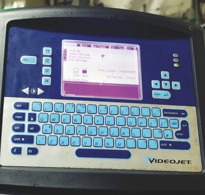
A control panel for one of several Videojet CIJ printers also on line.
Described as a “state-of-the-art system for measuring line pressure and 3D orientation,” inserting the Quantifeel sensor onto a live packaging line outfitted with data-reading sensor tags enables users to generate a real-time pressure map of all the key pressure points encountered at various points along the line on the user’s PC or other smart device—essentially painting a clear picture of where the potential problem areas are located on the line.
“By embedding the Quantifeel sensor into a line, the dynamic effect of pressure and movement exerted on the device can be observed in real-time and analyzed to understand the effect operational parameters have on line performance, improving efficiency, reducing wastage and minimizing downtime,” according to Smart Skin Technologies.
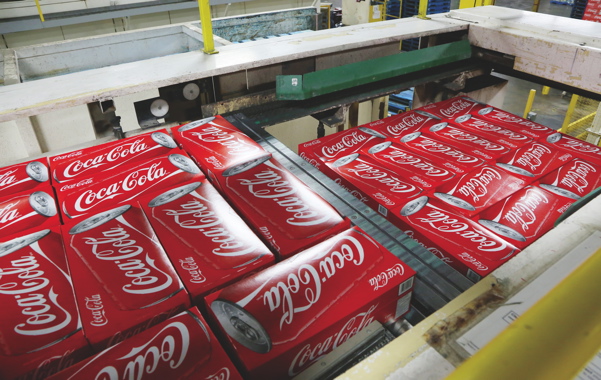
Filled cases of Coca-Cola cans are arranged into their assigned layer patterns for stacking on one of the Weston facility’s two fully-automatic T-Tek palletizing stations positioned directly below on the plant floor.
For Weston plant’s quality assurance manager Kavitha Naidu, implementing the Quantifeel system on the plant’s Line One earlier this year represents another milestone in the operation’s continued “journey to excellence” in reducing the number of consumer complaints to historical lows, with outright elimination of them treated as an achievable target.
Naidu reveals that her dedicated team leveraged its expertise in DMAIC (Define, Measure, Analyze, Improve and Control) problem-solving methodology to identify the common sources of consumer complaints: the so-called ELLFs of “empties, leakers and low fills.”
Says Naidu: “We were able to achieve high product quality while reducing the defects over the year by collaborating teamwork with dedication, commitment and technology.
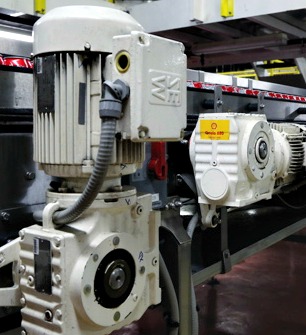
The Weston canning facility employs a multitude of heavy-duty SEW-Eurodrive electrical motors to power high-speed conveyors from Descon Conveyor Systems (see below) transferring the product through its packaging stages.
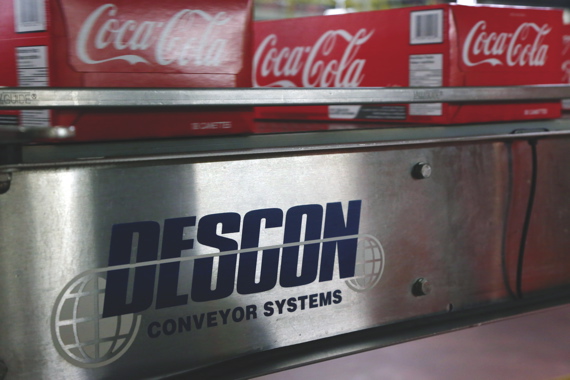
“With the packaging industry continuing to innovate with lightweight cans, it becomes all the more essential to identify the pressure points on the packaging line,” says Naidu, citing the pressure level of 60-psi as the maximum allowed tipping point for ensuring each can makes it through all the packaging stages in prime condition.
“Smart Skin is a highly reliable technology that could be effectively used as a troubleshooting tool in identifying the pressure points on the lines,” she explains, “especially around the packaging rails.
“The Smart Skin ‘can’ is identical to a regular aluminum can, containing billions of pressure sensors in its surface.
“As the Smart Skin ‘can’ is run on the conveyors along with the finished product cans, the sensors pick up the pressure points and the data is relayed as a live pressure map.
“Based on these reports, one can tell the exact location where an aluminum can could have got damaged or impacted due to pressure and hence fix the specific spots to reduce the pressure impact,” says Naidu, citing pressure, belt vibration, tilting, jamming and excessive can rotation as the most common culprits behind the incidence of dented or otherwise damaged cans.
“The data obtained through the Quantifeel system has enabled us to reduce the pressure on the cans along the many different bends, turns, curves and rails—thereby reducing the dents and leakers on our finished goods.
“Restoration of the filler and seamer, training to develop competency of the operators, tighter inspection program, and frequent audits also improved the process, thus reducing the dents and damages on the can body,” says Naidu, adding the Weston plan is considering implementing the Quantifeel system on its other three packaging lines down the road.
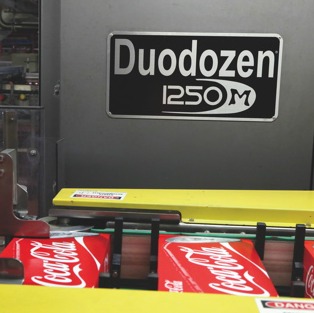
Manufactured by WestRock, the fully-automatic model Duodozen 125M cartoner is a high-speed multipacking system used by the Weston plant to package both 12- and 18-pack cases of canned product at line speeds of up to 1,600 cans per minute.
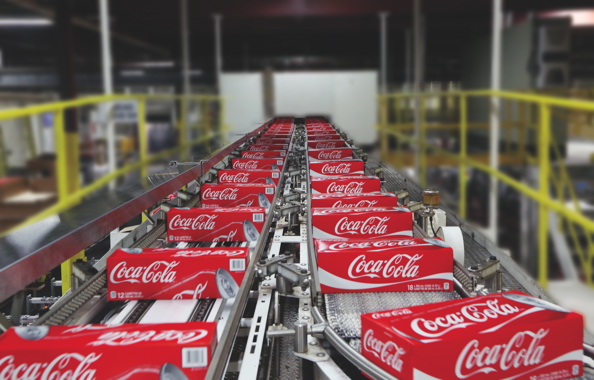
This would further enhance the plant’s formidable manufacturing skillset based on a well-integrated assortment of “world-class automation technologies,” according to Naidu, that make the facility run like clockwork throughout the years, even during its super-busy summertime seasonal peak.
“Our process is fairly automated, with the cans received just-in-time and automatically loaded into depalletizers and transferred through conveyors in single file to the filler to be filled with the product and sealed,” Naidu describes.
“After the empty cans are filled, and the filler operator ensures that all the quality requirements are met, the cans are automatically case-packed, palletized and stretchwrapped to be shipped to the market,” says Naidu, noting the plant exclusively uses the more compact custom-sized CHEP wooden pallets to enable the forklift drivers to haul off two full pallet loads for shipping or storage in one trip.
“Everything we do here is driven by our culture of continuous improvement in productivity and quality,” Naidu states, citing the plant’s ambition to reach the designated “world-class” status within the global Coca-Cola network by the end of 2017.
“Our products service a broad variety of retail, institutional and foodservice customers from coast to coast,” she points out, “and it is our goal to service the market by providing the customers with the most convenient package of highest possible quality.
“While many consumers are looking for convenience by opting for smaller packages, like our well-received 222-ml mini-cans, there are also many consumers looking for greater value in our big packaging formats, so it is our job and to provide the customers with the most convenient package for them.
“We must be doing our job well because our customers love our products,” Naidu asserts.
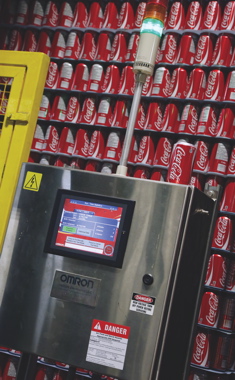
Stacked layers of empty aluminum cans shipped from Ball Packaging have their UPC numbers and barcodes collected and verified by an OMRON Electronics controller prior to being unloaded inside the depalletizer and fed onto the packaging lines.
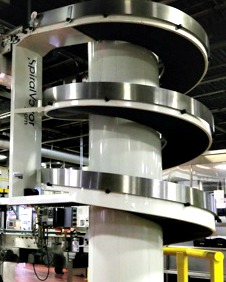
The SpiralVeyor vertical conveyors manufactured by AmbaFlex are used throughout the 225,000-square-foot plant to enable smooth and gentle transfer of filled cases of Coca-Cola cans to the building’s end-of-line packaging area for palletizing and stretchwrapping.
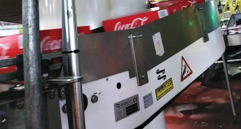
“The brand loyalty for our products is one of the highest in the industry,” she says, adding the Weston plant is fully committed to combining its operational excellence with Top Tier environmental performance.
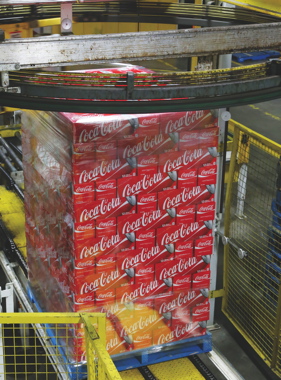
Positioned at the end of the plant’s canning lines, one of the fully-automatic Octo-Thread rotary ring stretchwrappers from ITW LCS swings into action to apply tight layers of stretchwrap film around the palletized loads to ensure maximum stability in transit.
Aside from using fully-recyclable primary and secondary packaging—including aluminum cans supplied by Ball Corporation and recycled paperboard folding cartons manufactured by WestRock (formerly MeadWestvaco)—the Weston plant has carried out a number of significant process improvements to help minimize its environmental footprint in recent years.
“We are 100-percent committed to achieving our company’s 20/20 vision,” states plant manager Silva-Zapata, citing the company’s publicly unveiled 2020 Vision and Roadmap for Winning Together global corporate plan that pledges, among other things, to make Coke “the global leader in sustainable water use and industry leadership in packaging, energy and climate protection.”

Manufactured by Nordson Corporation, the 25-liter model DURAblue 25 adhesive melter utilizes the Advantra LT range of hot-melt adhesives from H.B. Fuller (see below) to ensure efficient, secure and reliable gluing of carton flaps on all the filled multipack cases of Coca-Cola cans packaged at the Weston canning plant.
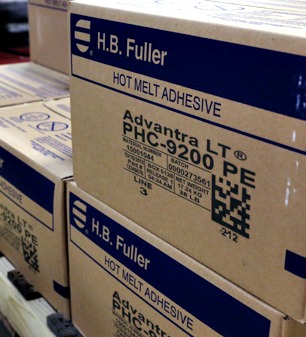
Says Silva-Zapata: “We are extremely proud to have achieved 100-percent internal recycling rate in our manufacturing facilities, and with water stewardship as one of the most important drivers in the company, we are also proud to have achieved world-class WUR (water usage ratio), which means that the total amount water used towards production is very close to minimal loss.
“This is also the case with our EUR (electricity usage ratio) performance,” he points out.
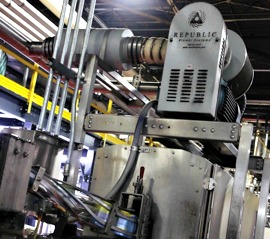
The Weston plant’s canning lines employ high-performance centrifugal blowers, manufactured by Republic Manufacturing and distributed by R.E. Morrison Equipment, which quickly dry the fast-moving rinsed cans traveling on overhead conveyors above before they enter the filling stations downstream to commence the hot-fill pasteurization process.
Going forward, both Silva-Zapata and Naidu expect the Weston plant to remain a key part of Coca-Cola Canada’s manufacturing landscape of the future by continually improving its operational efficiencies, product quality, customer satisfaction and, of course, packaging excellence.
“Packaging always has a significant impact on our marketing strategies,” Naidu sums up.
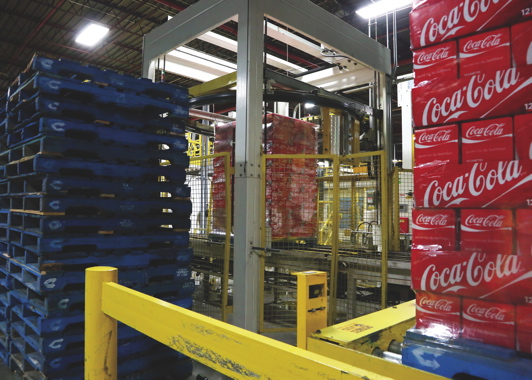
The Weston canning plant exclusively uses the signature-blue wooden pallets (above left) supplied to the facility in large quantities daily by leading pallet pool operator CHEP Canada in custom-sized dimensions that enable the plant’s forklift operators to pick up and carry off two full pallet-loads at a time for maximum workflow efficiency.
“As consumers look for convenience and value and as our customers look to minimize their amount of inventory,” she relates, “our supply chain team is continually challenged to implement an adaptable distribution network with equipment that will provide the required flexibility and speed-to-market to succeed well into the future.
“Given the right tools, such as the Smart Skin technology for example, there is nothing our people cannot achieve,” Naidu concludes.
“At the end of the day, our biggest core competitive strength is our people.”
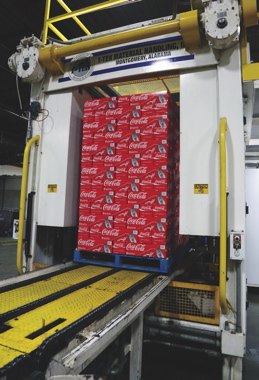
A fully-stacked 21-layer pallet-load of canned cases emerges from a T-Tek palletizer to make its way to a nearby ITW LCS stretchwrapper to secure the load into place to ensure optimal product safety during transport.
Advertisement

